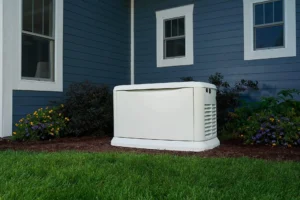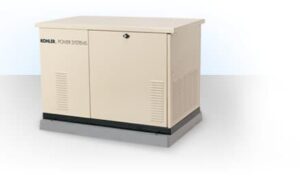There is no good time for your home or business to be without power. While many of us may have small, portable generators for camping, tailgating, or for a worksite, they aren’t big enough to power an entire structure. That’s why many homeowners and business owners are turning to larger, stationary generators.
As a homeowner, generators will keep you and your family comfortable, safe, and secure during the strongest weather events. For business owners, you won’t have to worry about lost productivity if there is an outage of some sort. Generators will also keep perishable products from going bad, costing you even more money.
When installed correctly, properly sized generators are workhorses that can run for long stretches of time with little trouble (the only downtime may occur when it’s time for refueling). The key is to keep them serviced: Your generator requires regular maintenance, even when not in use.
How often should a generator be serviced?
Depending on the make and model of your generator, some of the maintenance can be done by generator owners themselves. However, we recommend scheduling an annual inspection with certified, experienced professionals. Even if the generator for your home or business hasn’t been used, there are still steps to take to get the most out of your equipment.
When you have the generator installed, ask if the contractor for a list of preventive maintenance tasks to follow from the manufacturer. It might even make sense to go over the checklist with your installer so you know where the gauges are, how to read them, and other aspects of the equipment that you can maintain. If a maintenance kit is included, go over how these tools are used.
We generally recommend this checklist for monthly maintenance:
- Check oil and coolant levels – Low levels of oil and coolant are a few of the main culprits when a generator sputters, overheats, or just all-out fails. For coolant, locate the reservoir and check the marks on the tank. To check the oil, remove the dipstick, wipe it down, and reinsert it. Pull it out once again and see where the level is on the dipstick. Add more oil if necessary.
- Keep Clear of Debris – Backup generators work best when they have plenty of “elbow room.” Make sure bushes or tree limbs are cleared away from the generator as leaves can enter through the vents and cause disruption. During the winter, make sure snow is cleared away, too. You may even want to make sure no rodents have taken up residence on the interior.
- Clean Starting Battery – Just like with your car’s battery, keeping the nodes clear of corrosion will ensure proper operation. While this should be part of your monthly inspection, make sure to check after an operation, too.
- Air Filter – Check the air filter monthly for a buildup of dust, grime, and other debris, especially after continual use. In dusty areas, you may want to check more often. A clean filter will help keep your power generator running smoothly.
Test Your Generator
In most cases, a generator is put in place to provide backup power when the primary power source goes offline for whatever reason. While we do get the occasional weather event in the Pacific Northwest, most of us will go a year or two or longer without ever losing power.
But you still want to be ready when an outage does occur. Start your generator up once a month to make sure it’s still in good working order. If the generator will be standing idle for months on end, you may want to consider emptying any remaining gas in the generator or letting the generator run until the gas runs out.
Use Fresh Gas
Regular unleaded gas contains a little bit of ethanol to help it burn efficiently and completely, which is great for your car, lawnmower in the summer, and other equipment that is being run consistently. In a generator that is rarely used, however, ethanol can start to bond with water moisture and ruin the integrity of the gas.
So when you’re testing your generator, add just enough gasoline to get it up and running for 15 minutes or so. If you are unsure how to empty any remaining gas, you could let the generator just run dry. However, make sure the generator is unplugged from any devices as the sudden loss of power could cause problems for those devices.
Work With Experience
Regardless if your generator has been used throughout the year or you’ve never experienced a power outage, you should still have a licensed professional perform maintenance at least once a year. They’ll be able to “lift the hood” so to speak for a more intensive look. This includes looking at spark plugs, oil filters, fans, belts, and other parts that need a trained eye.
Prairie Electric has years of installation experience and performing preventative generator maintenance. If you have a generator that needs service, or you’re thinking of having a generator installed, please reach out to Prairie Electric to schedule an appointment. We’ll keep your existing generator in top shape or help you choose the right generator for your property.

